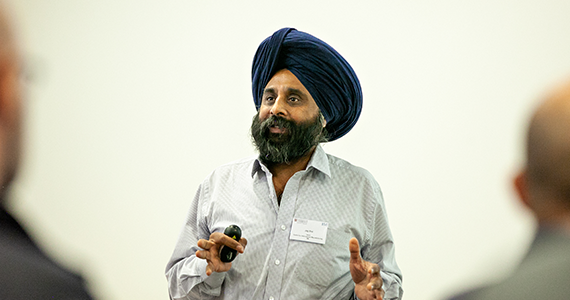Interview with Dr Jag Srai, newly appointed Co-Chair of Cambridge Global Food Security

A member of the network since its inception in 2011, Jag is strongly committed to its continued development. As Head of the Centre for International Manufacturing at the Institute for Manufacturing (IfM), his research into sustainable food supply chains connects with many other disciplines. He talked to Programme Manager Jacqueline Garget about the challenges and opportunities he sees ahead.
Jag, you’ve been involved in the Cambridge global food security network since the beginning. How has it developed over the past seven years?
Prior to its IRC status, and before that Strategic Research Initiative (SRI) status, Cambridge Global Food Security was essentially a small group of researchers - ‘the coalition of the willing’ - trying to understand what each other did. We’ve gone from this modest start, to finding shared challenges and creating strategic research goals, to running some really ambitious interdisciplinary research programmes. Our successes in major research grant applications include the GCRF-funded TIGR2ESS programme (Transforming India’s Green Revolution by Research and Empowerment for Sustainable food Supplies), and the EIT Food programme – in both cases expertise within the IRC has been key to our participation at such an interdisciplinary level.

Jag with key members of GCRF-funded TIGR2ESS team at the project's official announcement in Cambridge, in July 2017.
Your work on supply chains is a key issue in global food security. What are the main challenges?
We’ve become overly reliant on very international, extended food supply chains without really being aware of the implications. It’s a risky and vulnerable strategy for many reasons. Often foods are sourced from lower-cost, resource-challenged countries. What is the sustainability of that? Also, the modern retail supply chain demands a certain quantity of product to be delivered on time, typically 365 days a year. The supply side has to make long term commitments about their land and their harvest cycles. But food has nuances around seasonality and uncertainty of yields. This creates tensions, and an excessive amount of waste. There are other sustainability issues to consider too. In the transfer of goods internationally, it’s not just the product being exported but the resources that were used to make it - water, for example. We often talk about a carbon footprint for the product itself, but we should also think about the footprint of the resources in the extended supply chain. It’s a complicated scenario.
Does your work also try to address the important issue of food waste?
If we can try to balance food supply and demand, maybe we can tackle the huge waste in the supply chain. I’m also interested in e-commerce, last-mile logistics and the way modern retail interacts with the consumer. We’ve had a number of recent projects looking at the viability of supplying food on-demand for consumers who are looking for both choice and convenience. On the surface this looks like a wasteful supply chain where consumer sentiment is king. But there are new arguments that suggest that by tailoring the products customers receive and making choice more real-time, there could be less waste and a more efficient supply chain*.

Jag speaking about waste in the food supply chain at a Cambridge Global Food Security event.
How might the Cambridge Global Food Security IRC help to advance this work?
An integrated supply chain connects a huge set of disciplines, from efficient crop cultivation to optimising the manufacturing processes, connecting manufactured goods to the end consumer, and understanding consumer behaviour. Even within those sub-divisions there’s a whole series of disciplines. In the process of agricultural production, for example, you need plant scientists, geologists, engineers and agronomists. It’s very difficult for one research group to have all the skills required to optimise one stage of the supply chain let alone consider wider food system level issues. The IRC brings together this expertise and provides the capability to have more of a ‘systems’ view on this very complex problem. That’s a real strength of the network; we can catalyse these interdisciplinary conversations between different experts.
What do you plan next, as the new Co-Chair of the Initiative?
Next we must continue to build the community, and catalyse more interactions across our various departments at the University of Cambridge. Success for me would be expanding the number of collaborators from the different departments working on joint projects, enabling the IRC to become self-sustaining. We also need to continue reaching out beyond our research community too. As will become clear in our April Symposium**, some of the solutions to food security challenges aren’t going to come from science and technology. Our role is also to use our research to provide robust evidence to inform policy-makers and public response. As we establish our interdisciplinary credentials in Cambridge, our global remit will require us to extend our engagements with global policy makers, industry (both large and small) and academia as part of our development. Working with industry, and understanding the impact of what we do on society more broadly, are key priorities for me.
This article was originally produced by and for Cambridge Global Security.









